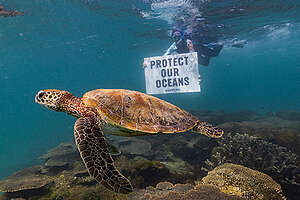Last Friday, the Environment Minister Tony Burke effectively told UNESCO, ‘don’t worry, be happy’, in response to grave concerns about the future of the Great Barrier Reef.
This blog first appeared in The Punch
Burke’s response follows a UNESCO investigation of the Reef conducted in June last year. At that time UNESCO requested that Australia “not permit development that would impact on the outstanding universal value of the Reef”. UNESCO also warned that the Reef was at risk of being added to the list of World Heritage sites that are “in danger”.
In addition to longstanding problems associated with agricultural run-off and plagues of crown of thorns starfish, the Great Barrier Reef is now under imminent threat from expansion by Queensland’s out of control coal industry. Staggeringly, there are currently proposals for nine new coal export terminals and associated infrastructure for the Great Barrier Reef coast.
Disappointingly, Burke’s response on Friday failed to provide any clear guarantee of the Reef’s future. Adopting weasel words, the Australian Government told UNESCO that it will only approve projects “if the residual impacts on protected matters, including Outstanding Universal Value, are determined to be not unacceptable”. It remains to be seen how UNESCO will respond.
As recently as October 2012, Minister Burke approved the T3 coal terminal at Abbot Point in Central Queensland. The construction of T3 requires the dredging and dumping of millions of cubic metres of the sea floor of the Great Barrier Reef World Heritage Area and the loss of turtle and dugong habitat. If T3 is built, as many as 500 more coal ships will transit through the Reef each year, each bringing risk of catastrophic damage should anything go wrong.
And direct damage from construction of coal infrastructure is only a fraction of the problem. If current plans for the expansion of Queensland’s coal industry go ahead, then the world will be on the path to levels of global warming that would be fatal to the Great Barrier Reef. The opening up of coal reserves in Queensland’s Galilee Basin alone could result in annual emissions that are almost double what Australia domestically emits annually.
Burke is politically fortunate in benefitting from comparison with Queensland’s State Premier Campbell Newman. Last year, Newman responded to UNESCO’s concerns by saying bluntly that Queensland is “in the coal business” and his government has been ruthless in slashing the state’s environment department, and rushing new bills through parliament to reduce environmental safeguards.
Most of UNESCO’s world heritage in danger sites falls within developing nations, failing states or war zones. The Taliban’s destruction of the great Bamiyan Buddhas in 2001 remains the most infamous example of world heritage being destroyed. If our Reef is placed on the List of World Heritage in Danger it will be acutely internationally embarrassing.
In appeasing the coal industry, our politicians are letting down other sectors of the economy. The degradation of the Reef at the behest of the coal industry would be disastrous for the tourism and fishing industries, leading to real existing sustainable jobs being lost for good. Then there are the opportunities in renewable energy. As the Climate Commission has said, ‘Queensland is truly the Sunshine State with some of the world’s highest levels of solar exposure’. Instead of digging up dirty coal, Queensland could be at the forefront of renewable energy. Newman, true to form, has wound back government support for Queensland’s solar projects.
It is shocking that our political leaders are even contemplating the industrialisation of the Reef. Australians should be entitled to assume that if something is world heritage listed, then our politicians will do their honest best to protect it. Instead, we face the grim prospect that government will connive with the coal industry to degrade and destroy our Reef.
However, history gives reason for hope. A generation ago, plans were afoot to drill for oil in the Great Barrier Reef area. Back then we were worried, we were not happy, common sense prevailed and the oil drillers were sent packing. Today, we can again say no against the new threat posed by the coal industry. The out of control coal industry can be stopped. It is time that as a nation we again made it clear that some things are too precious to lose.
David Ritter is CEO of Greenpeace Australia Pacific.

